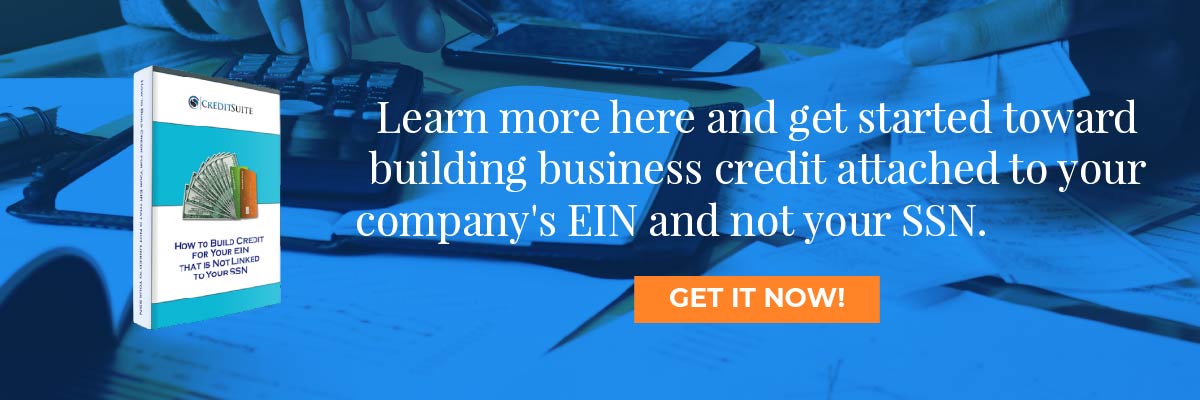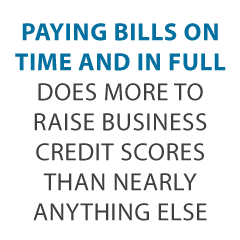- Connect With Us!
- (877) 600-2487
- info@creditsuite.com
5 Secrets to Building a Strong Business Credit Profile
Published By Janet Gershen-Siegel at December 20th, 2015
Establish a Strong Business Credit Profile – We Show You How
As a business owner, you may have considered how you’re going to get sustained funding for your venture. The best way is with a strong business credit profile.
What is Business Credit?
Business Credit is credit that you get in a Business Name. With business credit, the Business builds its own business credit score. Build a business credit profile – and with an established credit profile and score the business will then qualify for credit.
This credit is in the business name and based on the business’s ability to pay, not the business owner’s since the business qualifies for the credit, in some cases there is no personal credit check required from the business owner.
The business can use its credit to qualify for retail credit cards like Staples, Lowes, Sam’s Club, Costco, BP, and Walmart. And you can even score small business credit cards with MasterCard, Visa, and AMEX. The business can also qualify for credit lines and loans.
Here are 5 secrets you should know to how to build business credit. Because a strong business credit profile is a business asset – and you want it!
Building a Strong Business Credit Profile: #5 Your Business Must be Fundable to Get Initial Business Credit
The perception lenders, vendors, and creditors have of your business is critical to your ability to build strong business credit. Before applying for business credit, a business must insure it meets or exceeds all lender credibility standards.
It is very important that you use your exact business legal name. Your full business name should include any recorded DBA filing you will be using. Insure your business name is exactly the same on your corporation papers, licenses, and bank statements.
Whether you have employees or not, your business entity must have a Federal Tax ID number (EIN). Just like you have a Social Security Number, your business has an EIN.
Use your Tax ID number to open your bank account and to build your business credit profile. Take the time to verify that all agencies, banks, and trade credit vendors have your business listed with the same Tax ID number.
The Best Way to Build Credit – Make Your Business Fundable
Your business address must be a real brick and mortar building with a deliverable physical address. It cannot be a home address, cannot be a PO Box and cannot be a UPS address. Some lenders will not approve and fund unless this criteria is met. If you don’t have a physical address you can also consider using a virtual address on your application.
Building Business Credit with Your Phone Numbers
To get approved for business credit, you must have a dedicated business phone number that is listed with 411 directory assistance, under the business name.
Lenders perceive 800 Number or toll-free phone numbers as a sign of business credibility. Even if you’re a single owner with a home-based business, a toll-free business number provides the perception that you are an even bigger company.
A cell or home phone number as your main business line could get you flagged as an un-established business that is too high of a risk. DON’T give a personal cell phone or residential phone as the business phone number.
How to Build Business Credit with Your Online Presence
Credit providers will research your company on the Internet. It is best if they learned everything directly from your company website. Not having a company website will severely hurt your chances of obtaining business credit.
It is important to get a company email address for your business. It’s not only professional, but greatly helps your chances of getting the thumbs up from a credit provider. Setting up a business email address is just too easy and inexpensive to neglect. Make sure you avoid using free email services like Yahoo and Hotmail.
Get awesome funding with our foolproof guide to building business credit.
Building a Strong Business Credit Profile: #4 Start Building Business Credit with Vendor Accounts
A business credit report can be started much the same as a consumer report commonly is, with small credit cards. A great way how to build credit with a credit card is to start small.
The business can get an approval for small credit cards to help them build an initial credit profile.
These types of initial cards in the business world are commonly referred to as vendor credit.
How to Establish a Business Line of Credit
You may be asking: how to get a line of credit for my business? You get it from working with vendors.
A vendor line of credit is when a company (vendor) extends a business credit line to your business on Net 15, 30, 60 or 90 day terms.
This means that you can purchase their products or services up to a maximum dollar amount and you have 15, 30, 60 or 90 days to pay the bill in full.
So if you’re set up on Net 30 terms and were to purchase $300 worth of goods today, then that $300 is due within the next 30 days.
You can get products and services for your business needs and defer the payment on those for 30 days, thereby easing cash flow.
And some vendors will approve your company for Net 30 payment terms upon verification of as little as an EIN number and 411 listing. They will approve you, even with an average credit score. This is a fantastic way how to apply for a business line of credit. And it’s an even better way how to qualify for a business line of credit.
Check out some vendors who will approve you for initial credit, even if you have none now.
Your D&B Business Credit Profile
When your first Net 30 account reports your tradeline to Dun & Bradstreet, the DUNS system will automatically activate your file if it isn’t already. This is also true for Experian business credit and your Equifax business credit profile.
You need to have a total of at least five (5) Net 30 day pay accounts reporting. Some vendors require an initial prepaid order before they can approve your business for terms.
Pay your Net 30 vendor accounts in full and on time. You must be patient and allow time for the vendors’ reporting cycles to get into the reporting systems. How long does it take to build credit? It typically takes 3 cycles of Net accounts reporting to build credit scores.
Building a Strong Business Credit Profile: #3 Do NOT Use Your SSN When Applying for Business Credit
Many entrepreneurs think they have business credit established because they applied and got approval for business credit cards.
But most business credit cards available today report to the consumer credit reporting agencies, not the business reporting agencies. And most of these accounts also require a personal guarantee from the business owner, meaning they are personally liable in case of default.
True business credit doesn’t require a personal guarantee from the business owner. Instead, the EIN credit profile is pulled, reviewed, and used to determine approval.
When EIN credit is used for the approval instead of SSN credit, the business owner isn’t liable for that credit personally. This is the only real way to separate personal and business liabilities, to obtain EIN credit that’s not linked to the owner’s SSN.
How to Create a Business Credit Profile Not Connected to Your SSN
To do this the business owner must leave the SSN file on the application blank. This will seem a little odd to most because this isn’t what we’re conditioned to do. Usually when we see an SSN field we think it must be filled in; many credit issuers will even insist that it is.
But when it is left blank on a business application, the credit issuer then pulls the EIN credit profile instead, and that profile is used to determine approval.
If the entrepreneur has used vendor accounts to establish their business credit profile and score, then they’ll have tradelines reporting. And they will build business credit profile. Plus they will establish a score.
That profile and score is then used to determine their approval. And since no SSN was supplied, personal credit wasn’t even pulled or used in the approval decision.
This also means there is no inquiry placed on the business owner’s consumer credit report, and they are not personally liable for that debt. So in case of default their personal assets cannot be pursued, only their business assets can.
To obtain real business credit without a personal guarantee the business owner must apply without supplying a SSN.
Some call representatives with business credit profile companies might insist on it being supplied, and sometimes you might need to apply by phone instead of online. But in all instances, insist your application be run using your EIN only so you can truly eliminate personal liability.
Building a Strong Business Credit Profile: #2 Apply for Retail and Cash Credit AFTER Establishing Initial Credit
You can’t walk into your bank or a store like Staples and get approval for a consumer credit card when you have no prior credit established. The same is true in the business world.
To get retail and cash credit you MUST first have an initial credit profile and score established by using vendor accounts. Once you’ve done this then you can take the next step in building business credit which is to apply for retail credit cards.
Most merchants and major retailers offer business credit; they just don’t advertise it.
There is no benefit to the merchant to promote credit with no personal liability if the business owner is willing to take on that liability so they don’t promote their business credit cards and regularly ask for a SSN.
How to Build a Business Credit Profile With Retail Credit
After 5 or more trade lines are established using vendor accounts, obtaining retail accounts is the next step. You must get retail credit before you can start getting Visa, MC, AMEX type cards.
Most major stores offer business credit including: Home Depot and Lowes, Office Depot and Staples, Best Buy, Walmart, Sam’s Club, Costco, Amazon, Dell, Apple, BP, Chevron, Racetrack and most others.
Retail accounts good to apply for after you have 5 initial vendors reporting include Office Depot, Exxon Mobile, Amazon, and Tiger Direct. They often approve you with as few as 5 vendor accounts reporting.
Get awesome funding with our foolproof guide to building business credit.
Building Business Credit Profile With Cash Credit
Once 10 or more total accounts are reporting on your business credit profile, you can start to apply for cash credit cards such as Visa and MasterCard. AMEX also offers cash credit cards, but you’ll usually need a lot more accounts reporting, 3 years’ time in business, or millions in revenue to get an approval with AMEX.
Cash credit approval amounts will be equivalent to the highest credit limit account on the business report of your retail credit cards. So try to have 10 accounts with at least one of them having a $10,000 limit reporting before you apply for cash credit.
Dell is a good source to apply for to get a higher credit limit as they’ll often approve you for a limit of $10,000 without a lot of prior credit reporting.
It is essential to keep using the credit, keep applying for more, and talk with credit providers to raise credit limits.
You’ll then want to continue to apply for more credit, use that credit, and pay your bills timely to grow your credit profile and credit scores.
Building a Strong Business Credit Profile: #1 Pay Your Bills Early For Excellent Business Credit Scores
Consumer credit scores are complicated. They have 5 components and when you focus on improving one aspect of your score, you usually hurt another aspect.
For example, with your consumer FICO score the biggest score factor is payment history which accounts for 35% of your score. But if you apply for new accounts so you can show more of a positive history, you then lower the aspect of your score that deals with new inquiries.
Having a good credit mix accounts for 10% of your overall FICO consumer score. You have a better score with 1 – 2 car loans, 1 – 2 mortgages, and 3 credit cards.
But when you get a new car or home loan, you then owe 100% of what you borrowed. So your score immediately drops because of your utilization which accounts for 30% of your score.
This is why it takes many years of well-disciplined borrowing to get a good consumer FICO score, to get the right balance that’s needed to have excellent credit.
Get awesome funding with our foolproof guide to building business credit.
PAYDEX and Payment History
But in the business world things work differently. The main business credit score, the PAYDEX from Dun & Bradstreet, is based on only one factor. And that is payment history.
If you pay your bills on time, you get an 80 PAYDEX score. If you pay bills 90 days late, your score would be a 30. And your score would be a 50 if you pay your bills an average of 30 days late.
But if you pay your bills early, then your score can be in the 90 – 100 range. 100 is a perfect score. A 100 score means you pay the bill as soon as it’s received, way before it’s actually due.
D&B PAYDEX Score
The only thing that truly matters when it comes to business credit scores is if a business pays its bills on time.
| Expect payments may come early | 100 |
| Payment comes within early discount period | 90 |
| Payment is prompt | 80 |
| Payment comes 14 days beyond terms | 70 |
| Payment comes 21 days beyond terms | 60 |
| Payment comes 30 days beyond terms | 50 |
| Payment comes 60 days beyond terms | 40 |
| Payment comes 90 days beyond terms | 30 |
| Payment comes 120 days beyond terms | 20 |
| Unavailable | UN |
Of course most businesses can’t do this long term, where they pay every bill as soon as it comes in. So maintaining a 100 score isn’t reasonable. And it would look odd to lenders as well.
But you can get and keep a score of 80 – 90 fairly easily by consistently paying your bills on time or early every month.
The PAYDEX also takes into account something known as weighted average. With this they weigh your higher limit accounts heavier into your scores than your lower limit accounts.
So in any given month if you must decide which accounts to pay first, always pay your highest limit accounts to give yourself the highest PAYDEX.
Takeaways for Building a Strong Business Credit Profile
A strong business credit profile will pay dividends for years to come. If you’re looking for how to build a business credit profile, then look no further. A strong business credit profile comes from some planning and, yes, some work. But a strong business credit profile it more than worth it.

 " class="attachment-blog-single size-blog-single wp-post-image" alt="Get Business Credit Cards for New Businesses Credit Suite-Business Line of Credit Decoded" title="Get Business Credit Cards for New Businesses">>
" class="attachment-blog-single size-blog-single wp-post-image" alt="Get Business Credit Cards for New Businesses Credit Suite-Business Line of Credit Decoded" title="Get Business Credit Cards for New Businesses">>
